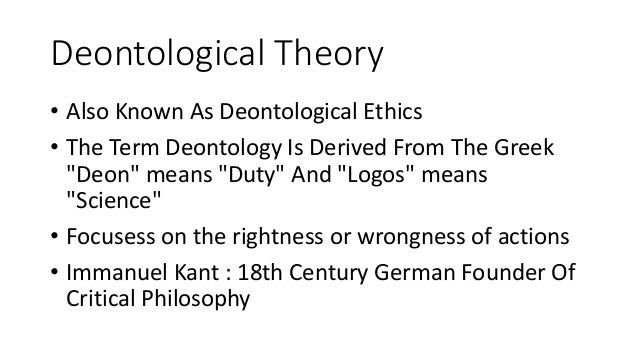
Definition Of Deontology Ethics. In this terminology action is more important than the consequences. It is sometimes described as duty or obligation or rule based ethics because rules bind you to your duty. Deontological ethics deontological ethics or deontology is the normative ethical theory that the morality of an action should be based on whether that action itself is right or wrong under a series of rules rather than based on the consequences of the action. Deontology is often associated with philosopher immanuel kant.

Because deontological theories are best understood in contrast to consequentialist ones a brief look at consequentialism and a survey of the problems with it that motivate its deontological opponents provides a helpful prelude to taking up deontological theories themselves. Deontology is an ethical theory that uses rules to distinguish right from wrong. Deontology is often associated with philosopher immanuel kant. Kant believed that ethical actions follow universal moral laws such as don t lie. Deontology or deontological ethics is the branch of ethics in which people define what is morally right or wrong by the actions themselves rather than referring to the consequences of those actions or the character of the person who performs them. It is sometimes described as responsibility commitment or rule based ethics.
Deontological ethics in philosophy ethical theories that place special emphasis on the relationship between duty and the morality of human actions.
The term deontological was first used to describe the current specialised definition by c. The term deontological was first used to describe the current specialised definition by c. Because deontological theories are best understood in contrast to consequentialist ones a brief look at consequentialism and a survey of the problems with it that motivate its deontological opponents provides a helpful prelude to taking up deontological theories themselves. It is sometimes described as duty or obligation or rule based ethics because rules bind you to your duty. Kant believed that ethical actions follow universal moral laws such as don t lie. Deontological ethics deontological ethics or deontology is the normative ethical theory that the morality of an action should be based on whether that action itself is right or wrong under a series of rules rather than based on the consequences of the action.